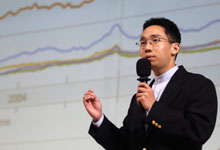 我長期以來都覺得經濟學裡的模型將人假設的太"聰明"。但是,經濟學家又認為當這一些人表現的不"聰明"的話就表示他不"理性"。所以理性到底是什麼? 而經濟學家又真得很理性嗎? 下面的故事是 Harry Markowitz (1990年諾貝爾獎得主,CAPM的始祖) 在做投資時的趣事:
我長期以來都覺得經濟學裡的模型將人假設的太"聰明"。但是,經濟學家又認為當這一些人表現的不"聰明"的話就表示他不"理性"。所以理性到底是什麼? 而經濟學家又真得很理性嗎? 下面的故事是 Harry Markowitz (1990年諾貝爾獎得主,CAPM的始祖) 在做投資時的趣事:所以若這麼天才的經濟學家都無法依照他自己所創的模型做投資決定,我們憑什麼認為現在的經濟學沒有什麼 "重大" 的問題。我個人認為經濟學有很嚴重的問題,需要更新的方法解決。實驗 anyone?
"There is a story in the book about Harry Markowitz,” Mr. Zweig said the other day. He was referring to Harry M. Markowitz, the renowned economist who shared a Nobel for helping found modern portfolio theory — and proving the importance of diversification. It’s a story that says everything about how most of us act when it comes to investing. Mr. Markowitz was then working at the RAND Corporation and trying to figure out how to allocate his retirement account. He knew what he should do: “I should have computed the historical co-variances of the asset classes and drawn an efficient frontier.” (That’s efficient-market talk for draining as much risk as possible out of his portfolio.)
But, he said, “I visualized my grief if the stock market went way up and I wasn’t in it — or if it went way down and I was completely in it. So I split my contributions 50/50 between stocks and bonds.” As Mr. Zweig notes dryly, Mr. Markowitz had proved “incapable of applying” his breakthrough theory to his own money. Economists in his day believed powerfully in the concept of “economic man”— the theory that people always acted in their own best self-interest. Yet Mr. Markowitz, famous economist though he was, was clearly not an example of economic man.







